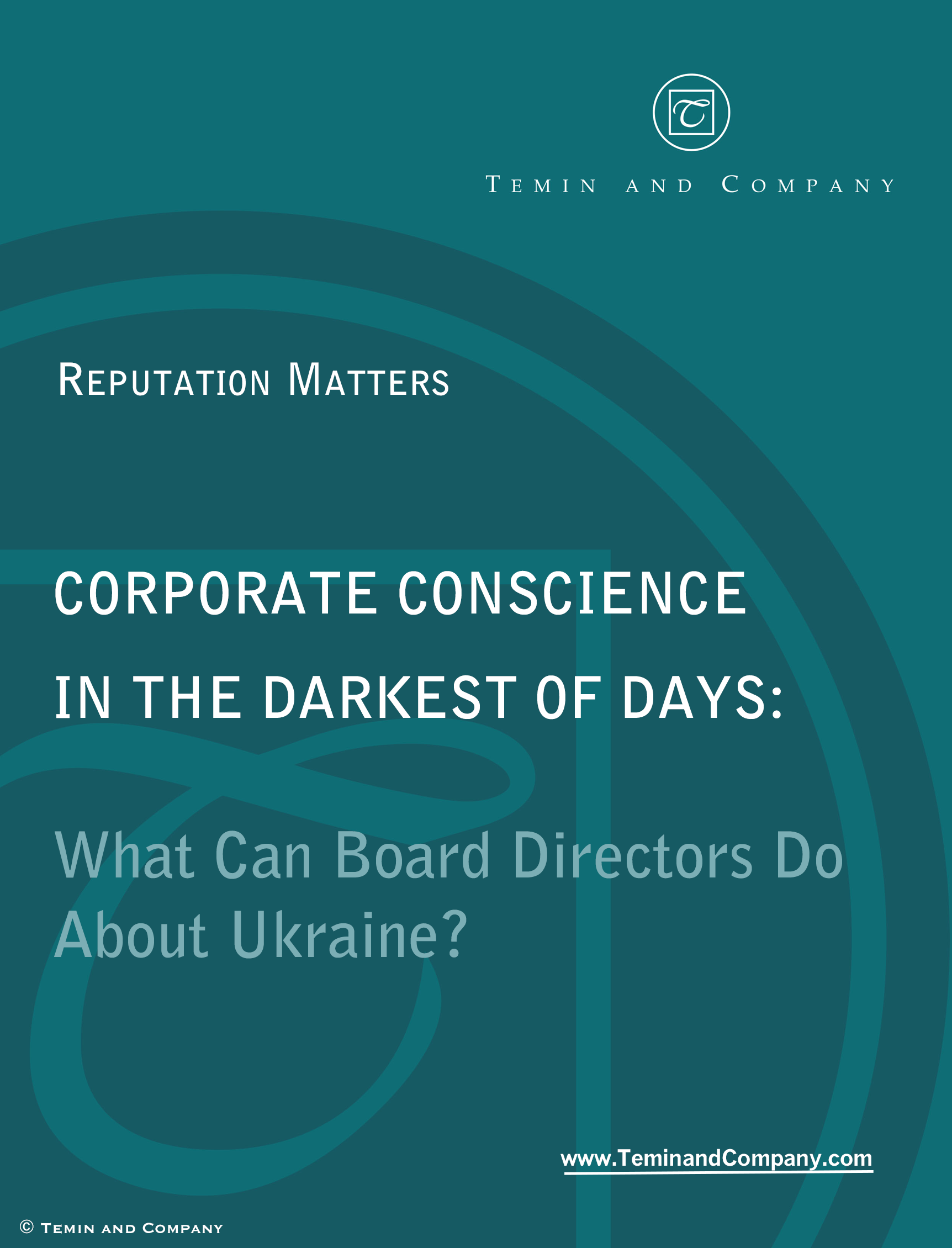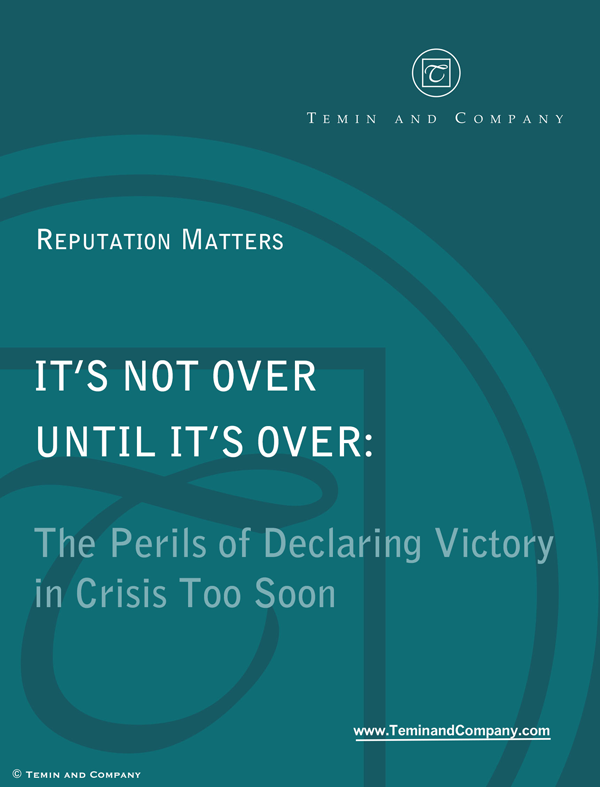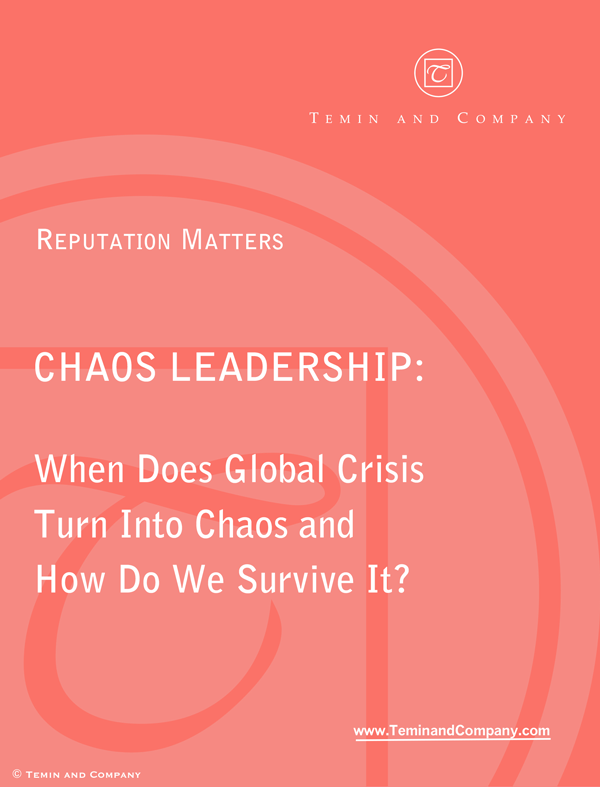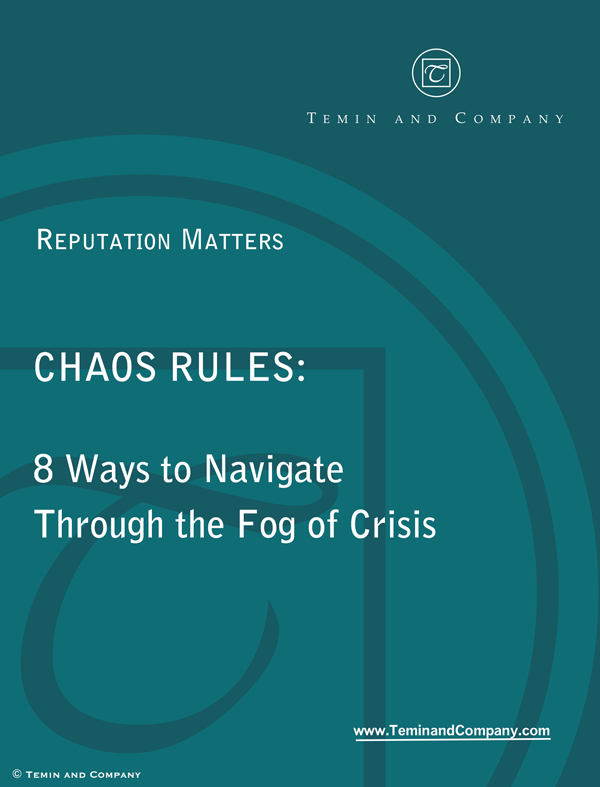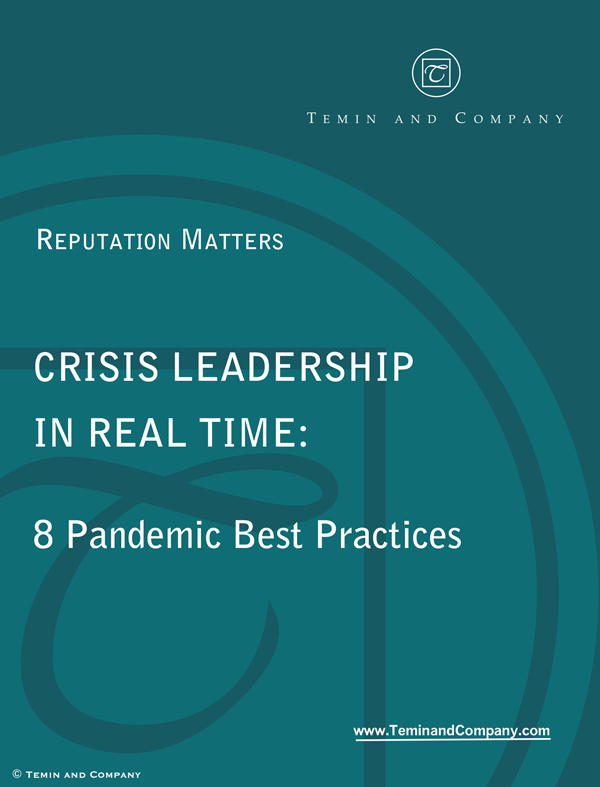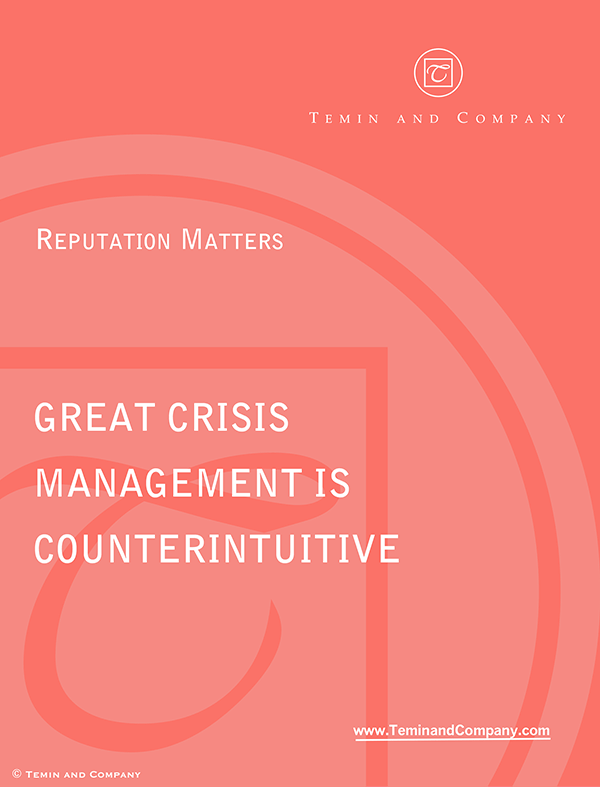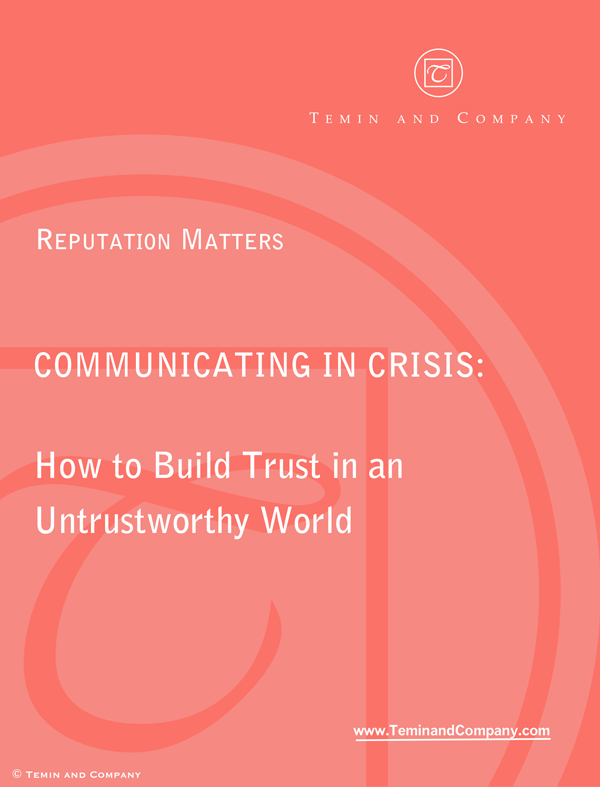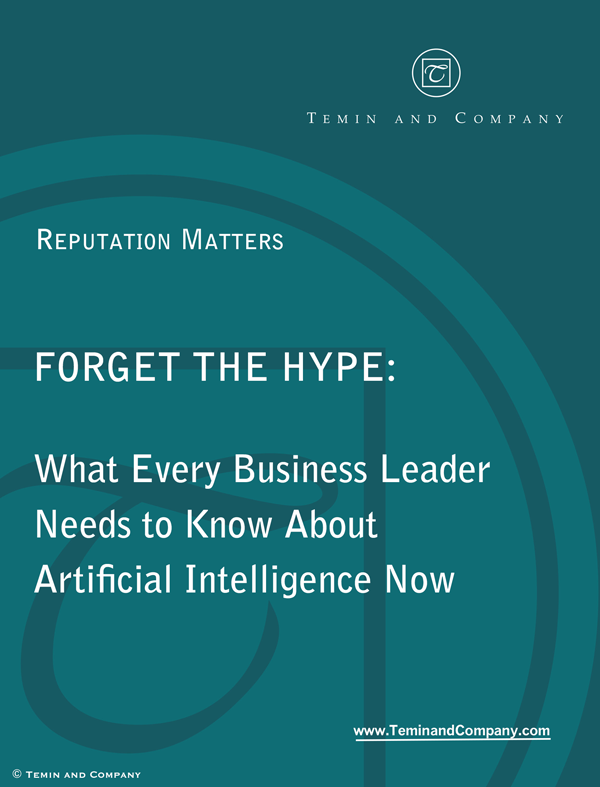Thought Leadership–Miscellaneous Articles
White Papers»
"Reputation Matters" White Papers seek to offer deeper insight on a wide range of topics we help clients address.
11 Attributes To Look For In Your Crisis Manager
Leadership, “Reputation Matters,” Forbes, January 16, 2024
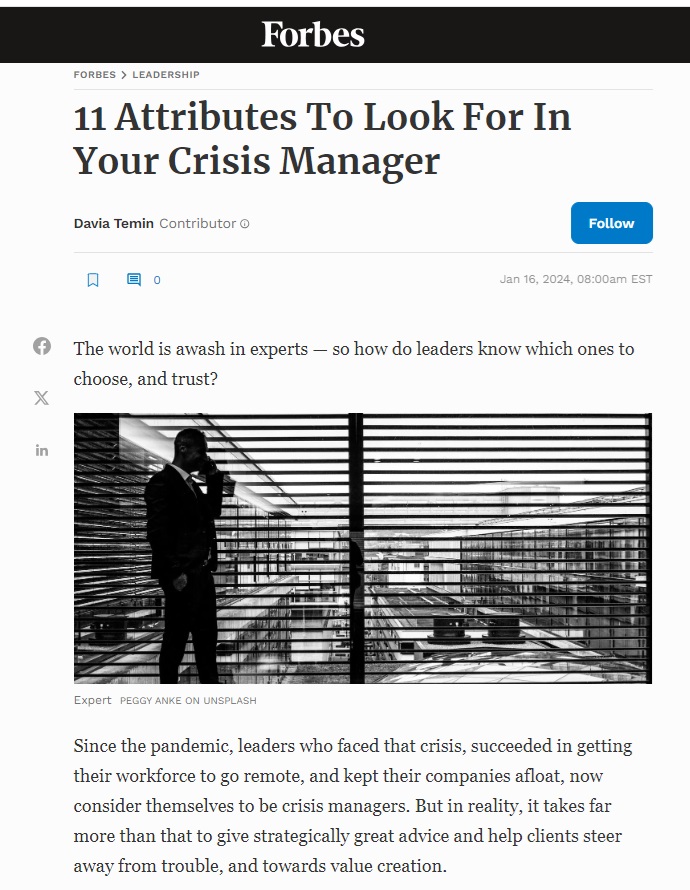
The world is awash in experts — so how do leaders know which ones to choose, and trust?
Since the pandemic, leaders who faced that crisis, succeeded in getting their workforce to go remote, and kept their companies afloat, now consider themselves to be crisis managers. But in reality, it takes far more than that to give strategically great advice and help clients steer away from trouble, and towards value creation.
In the first part of this two-part series we discussed how to judge judgment. After decades serving as a trusted strategy and crisis advisor to leaders in hundreds of different industries, settings, and situations, here are 11 stress-tested suggestions for how leaders can recognize whose advice to trust, and who to turn to in crisis. […read more]
Judging Judgment: How Can Leaders Know Whose Advice To Trust In Crisis Situations?
Leadership, “Reputation Matters,” Forbes, January 15, 2024
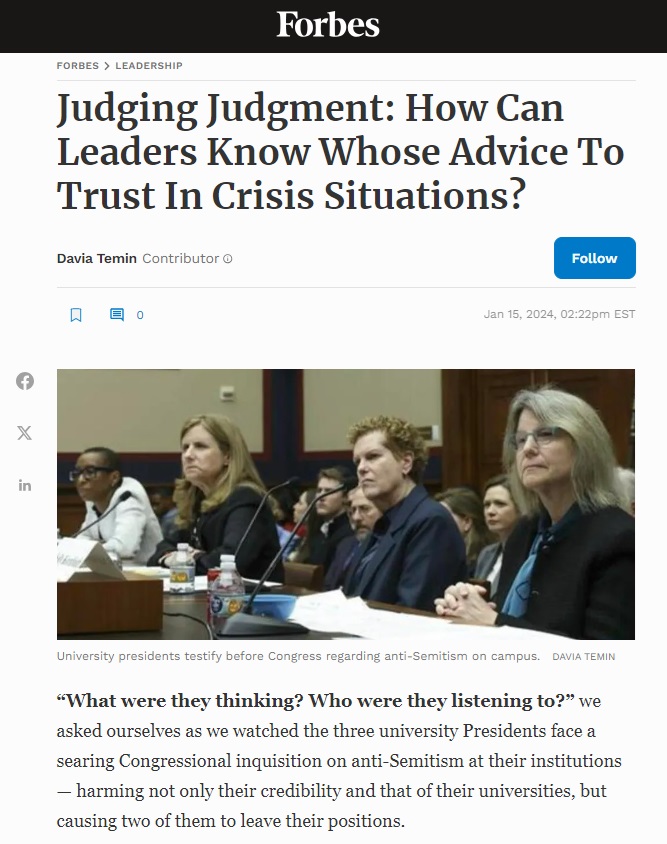
“What were they thinking? Who were they listening to?” we asked ourselves as we watched the three university Presidents face a searing Congressional inquisition on anti-Semitism at their institutions — harming not only their credibility and that of their universities, but causing two of them to leave their positions.
While the Presidents of MIT, University of Pennsylvania, and Harvard gave strong, elegant and convincing opening statements — all of which seemed strikingly similar — their advantage was dissipated during the questioning, which was notable for its toughness, but also for pushing the Presidents into a trap that was almost impossible to escape.
‘Yes or no’ they were told to answer by Representative Elise Stefanik, did the cries of “Intifada” on their campuses — taken to mean death to Israel and Jews — constitute bullying and harassment, and were thus against the rules of their universities?
The Presidents were basically asked the impossible question of the decade on college campuses — to choose between free speech and the banishment of hate speech that calls for violence. The question demanded strong, emotionally intelligent but institutionally decisive answers. And absolutely everyone knew that the question was coming. The need was for real answers, not verbal gamesmanship. Yet, the Presidents just were not prepared to answer the questions decisively and resonantly; they kept reverting back to the idea that there was no one answer — such bullying had to be taken “in context.” […read more]
The Nobel Prize Takes Aim Against Disinformation, Lies And Fakes
Leadership, “Reputation Matters,” Forbes, May 26, 2023
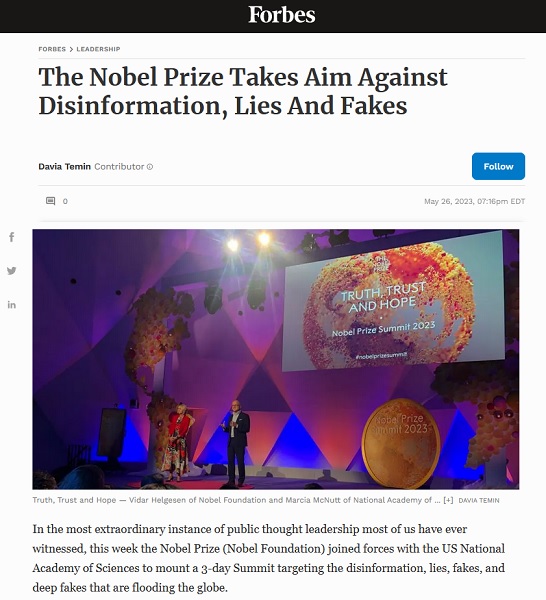
In the most extraordinary instance of public thought leadership most of us have ever witnessed, this week the Nobel Prize (Nobel Foundation) joined forces with the US National Academy of Sciences to mount a 3-day Summit targeting the disinformation, lies, fakes, and deep fakes that are flooding the globe.
The stakes could not be higher. From one-on-one ad hominem attacks, to the state-sponsored reputation destruction of political enemies, to the wholesale targeting of scientific findings, research and inquiry, disinformation campaigns are challenging our principles, truths — and souls. And, of course, social media and AI-enabled mimicry exacerbate the problem, putting our cognition more and more at risk. At their worst, they challenge our very understanding of reality, as well as our ability to trust anyone or anything.
Once there is no certainty to be found on the shifting sands of lies, trust dies a hard and ugly death.
So, who better to lead the charge than The Nobel Foundation and the National Academy of Sciences? In this three-day tour-de-force, titled “Truth, Trust and Hope,” they convened Nobel Prize laureates, notable experts, poets, artists, musicians, and even magicians to call out the problems caused by purposeful disinformation and truth destruction. […read more]
What Would Bezos Do?
Davia Temin, Directors & Boards, February 11, 2019
Lessons for boards on how unexpected boldness sometimes wins the day
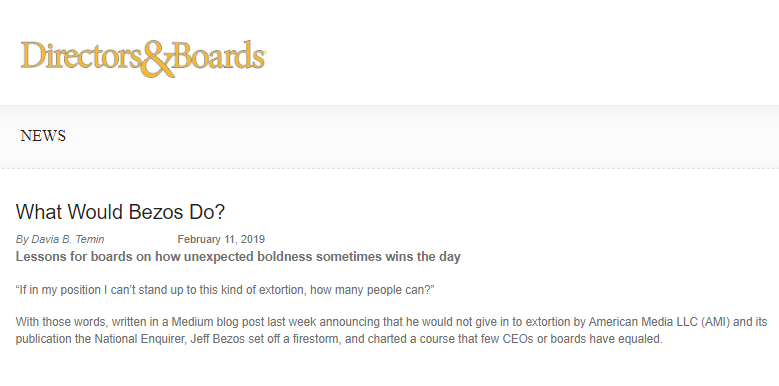
“If in my position I can’t stand up to this kind of extortion, how many people can?”
With those words, written in a Medium blog post last week announcing that he would not give in to extortion by American Media LLC (AMI) and its publication the National Enquirer, Jeff Bezos set off a firestorm, and charted a course that few CEOs or boards have equaled.
What the founder of Amazon, and the richest man in the world, did was show us how the head of a public company could put it all on the line to stand up to bullies. “Courage comes first,” he essentially told us, no matter what the personal or professional cost.
And apparently his prestigious board agreed. […read more]
Getting Intelligent About Artificial Intelligence: 6 Ways Executives Can Start
Davia Temin, Bruce Molloy, Jayanth Kolla, Leadership, “Reputation Matters,” Forbes, December 8, 2017

This past June, Fortune Magazine asked all the CEOs of the Fortune 500 what they believed the biggest challenge facing their companies was. Their biggest concern for 2017: “The rapid pace of technological change” said 73% of those polled, up from 64% in 2016. Cyber security came in only a far second, at 61%, even after all the mega hacks of the past year.
So, what does “technological change” entail? For almost all Fortune 500 CEOs, it means, in part, artificial intelligence. And, as we wrote in our piece yesterday on Forbes.com, “Forget The Hype: What Every Business Leader Needs To Know About Artificial Intelligence Now,” AI is on the lips of almost every global CEO and Board of Directors.
But apart from the Big 8 technology companies – Google, Facebook, Microsoft, Amazon, IBM, Baidu, Tencent, and Alibaba – business leaders, especially of earlier generations, may feel they don’t know enough about AI to make informed decisions.

We made a series of 6 suggestions of how board members and C-suite executives can begin to understand this brave new world of AI, Machine Learning, and Deep Learning. And, after being asked by a number of people to break that list out for them, we include it, slightly modified, here. […read more]
Forging Thought Leadership into a Titanium-Strong Marketing Tool
Dean Rotbart, Monday Morning Radio, March 23, 2015
This week on Monday Morning Radio, Davia Temin tells listeners how to forge thought leadership and reputation management into titanium-strong marketing tools – both for yourself, and for your company or products.
Davia is interviewed by Dean Rotbart, co-host of Business Unconventional, the one-hour radio newsmagazine that aired weekly on News/Talk 710 KNUS AM in Denver. […read more]
To listen to the full article, click below.
To download the podcast from iTunes, Click Here.
The Steak not the Sizzle — Women and Power; Women and Communications
CommPRO, March 7, 2016
As we all honor International Women’s Day in our own way, I’d like to turn for a moment to the topic of the growing power of women around the world, especially as communications becomes a core component of leadership, not just an add-on.
For so long, women both in the US and globally, if they chose to or had to work, only found jobs in “women-acceptable” professions, such as teaching, nursing, assisting, events, HR, PR, and communications. Far from being at the nexus of power, acclaim and remuneration, women were related to supporting, or decorative, roles.
Women have always been seen as strong — and academic research bears this out — in communications skills. Thus women have entered the field in large numbers. But unfortunately communications historically has been seen as one of those ancillary professions that supported power, but did not exert it. […read more]
Staying Ahead of the Game: The Steps to Effective Crisis Communications Planning
PR Newswire, March 12, 2015
Don’t wait for a crisis to hit before considering your communications strategy. Getting caught off guard can mean the difference between success and failure, especially if your competitors are quick to respond. Take action today to ensure tomorrow’s stability.
View PR Newswire’s on-demand webinar to obtain the tips and tools needed to craft an effective crisis plan. Davia Temin, CEO, Temin & Co. and Colleen Pizarev, VP, Communications Strategies, PR Newswire discuss: creating a crisis plan and messaging effectively; the role of boards in crisis; listening best practices and your social media response. […read more]
View the slides:
Women and Power: Seven Ways Successful Women Survive
American Banker, November 5, 2014
Two steps forward, one step back; one step forward, two steps back: for many women who have ascended the rungs of the financial industry, it seems that our progress has stalled out since 2008, despite making undeniable strides over the prior three decades. Absolute numbers have not moved or have gone backwards, doors continue to revolve, and we seem to be discussing the same issues publicly over and over again, while more compelling issues are left unaddressed.
But evolving research is shedding new light on power, gender differences regarding the use of power, and how powerful women can succeed in complex organizations.
Some of these insights are not positive or politically correct, but they do help explain gender gaps in finance and other industries. […read more]
What I Learned From Mickie Siebert: Put Your Head Down and Charge
Leadership, “Reputation Matters” Forbes, August 26, 2013
Mickie Siebert (aka Muriel) said, famously, when asked about the secret of her success: “I put my head down, and charge.”
Indomitable, irrepressible, fearless, salty, independent, and ultimately successful — the secrets of Mickie’s life are inspirational for both women and men leaders, both on and off of Wall Street. But, of course, it helps that she was such an early trailblazer for women in the all-male bastion of Wall Street, and that she charted a course that so many have followed, but so very few have succeeded at as well as she did. […read more]
White Papers»
"Reputation Matters" White Papers seek to offer deeper insight on a wide range of topics we help clients address.




